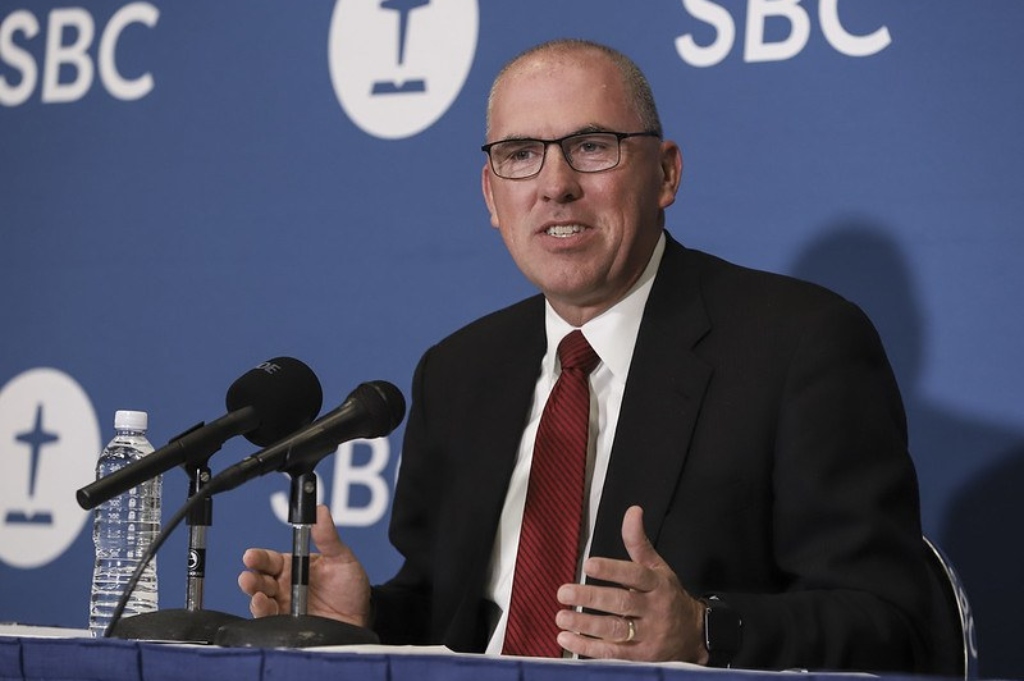BRENTWOOD, Tenn. (BP) — The Pastors Task Force on Southern Baptist Convention Evangelistic Impact & Declining Baptisms reported their findings in May. This diverse group of 15 summarized their work into five recommendations:
-
Pray for spiritual awakening.
-
Model personal evangelism and provide pathways.
-
Create a disciple-making culture.
-
Serve the next generation.
-
Celebrate evangelism and baptisms.
I am certain I can voice my heartfelt gratitude for multiplied thousands of others in America and around the world for the Task Force's hard work and thought-provoking conclusions.
An insightful statement concluded their report: "We pray this will be the first step in a movement that encourages a greater evangelistic impact and reverses the decline of baptisms in Southern Baptist churches."
The report included several other insightful comments from task force members which emphasize the fact that their report is only the first step. I was caught by the practicality of pastor Roger Spradlin of Valley Baptist Church in Bakersfield, Calif., who summed up the conviction of the group, "Continuing as we are, yet expecting a different result, is not an option. We must address this issue now." Also pastor Dennis Manpoong Kim of Global Mission Church of Greater Washington in Silver Spring, Md., said, "I am grateful for this endeavor's commitment to renew the passion for evangelism that ultimately begs the question: How then should we proceed?"
The next step
The report has brought us all to exactly the same correct question — "What is the next step?"
This unbelievably huge "SBC aircraft" loaded with nearly 16 million people from 46,000 American churches is fully into a rapidly accelerating nosedive toward a devastating crash. We also must remember that more than 4,500 missionary families around the world also ride within this American-made craft.
The situation is critical! It is far worse than many Southern Baptists realize and it's far later than most Southern Baptists would have ever thought.
But hear this! It is so much more doable to reverse this impending disaster than anyone would ever imagine. But we absolutely must take the "next step" correctly.
To dare suggest the "next step" is not in any way assuming that any single proposal is the only one possible. However, my (and many others') worldwide research and discovery indicates that the following approach is a definite "next step" that has the greatest potential to deliver Southern Baptists from our imminent disaster.
Don't forget — as urged in the report — we do not just need some improvement. It will result in "too little, too late" if we settle for only helping and reviving a few thousand choice churches. Such a misstep likely will only encourage many churches to forsake cooperation with an "everyone for themselves" survival approach. We can do so much better than that, and we must do it now.
I am currently reviewing the report of the first six months of the "next step" initiative undertaken by the network of churches called the Tennessee Baptist Convention (TBC). This strategy has come to be known as "1-5-1 Harvest Plants."
Through this model, in the course of a year, a church or small group within the church will seek to plant at least one off-campus, weekday, small, evangelistic, discipling gathering of approximately 10-15 people who are almost exclusively lost and unchurched people. These plants are usually found to be intuitive, organic and viral, and therefore easier to start and multiply while requiring little or no money. This is the first "1" of 1-5-1.
Next, the prayer and goal is that at least five new believers will be won to faith and baptized through the new plant (the "5" of 1-5-1) and then another new harvest plant will be planted by that group by the end of the year (the final "1" of 1-5-1). These plants can be one or more of three types of Harvest Plants — an off-campus branch of an existing group (like a Sunday School class, etc.), a new off-campus group, or a new church.
More than 700 TBC commitments were made to plant one or more of these three types of Harvest Plants. In the past six months 373 plants have been reported. One hundred and forty of these reporting plants won and baptized one or more persons, which came to a combined total of 743 won to Christ and baptized. These results indicate an approximate ratio of two baptisms per plant and a 5.6 ratio of persons required to reach and baptize one person within six months.
Even though most of these are young, start-up plants, people familiar with evangelism ratios will sometimes refer to such ratios as world-class evangelism/discipleship ratios.
Further included in this mid-year report are some plants that already are multiplying by reproducing "offspring" plants to form a second and even a third generation. Over the past four months there has been at least one new Hispanic church added each week to the TBC network of churches.
While taking this "next step" is easier than might be thought, it nonetheless requires focus, prayer, vision, dedication and hard work by church leaders and their congregations. Randy C. Davis, executive director/treasurer of the TBC, along with TBC pastors, congregations, association directors of missions, churches, trustees, TBC staff and others, are clearly providing just that kind of progressive team leadership and enthusiasm required for any successful, cooperative "next step."
This year, as a result of an overseas conference, a number of churches from several countries have joined others from Iceland to Argentina, Africa, Europe and beyond in making 1-5-1 Harvest Plants the "next step" they are using.
Throughout the research development stage and the pre-launch and official launch stages, the 1-5-1 Harvest Plants model has shown there are certain absolutes that must be embraced.
-
All churches of all sizes, all types of buildings, all locations, and with attendance from a few to the thousands, must have equal access and opportunity to succeed at the "next step."
-
Lost persons must be the primary focus. "1-5-1" has no interest in only planting non-evangelistic plants.
-
Baptism is a measurable demonstration of discipleship and is a primary indicator of plant progress.
-
Outside of the church building is the place to plant. (Ever see a farmer plant his crop in the barn?)
-
Laypeople must be mobilized by returning to biblical discipleship via on-the-job training. If this does not occur almost immediately, we will surely die!
-
No money. It is impossible for churches to pay or buy their way out of this catastrophe. Plants can flourish with no funding and very little money for training. If you'll catch fish, you will find those fish will have all the coins needed for Jesus and you (Matthew 17:27). Free materials are available online through the Tennessee Baptist Convention website.
-
Ethnic plants are absolutely imperative. Most churches and Christians now have world missions opportunities right in their backyards (no passports, shots, days off from work, etc., required). All or almost all of TBC's "1-5-1" ethnic church plants have required no funding other than perhaps some training materials.
-
Multiplication will make the difference between our past and future. It can cure ingrown and ill-formed classes, groups and churches, etc.
-
Cooperative Program giving is an excellent way to teach demonstrated discipleship and sharing, along with home and world missions. Some church plants have begun their dedication service by making a photo of their first Cooperative Program gift made through the TBC.
-
Takes time. There is no quick fix for getting out of the grave into which we have dug ourselves over many years. In 2013 "1-5-1" leaders listed their first two goals for 2014: 1) Help stop the "bleeding" i.e., the decline in baptisms and 2) Rather than just leveling out, that the TBC would have some small upward tick in baptisms/discipleship. Thanks be to God, both of those goals were accomplished even before the beginning of the year 2014! We must be committed to press on to higher ground.
-
If the "next step" for you is 1-5-1 Harvest Plants, please remember that all the materials you need to start are online and free of cost at www.tnbaptist.org/harvest. Also, be certain to consider all the free materials for "More Life," an evangelistic guide (including a Hispanic version), in addition to a cell phone app in various languages.
(EDITOR’S NOTE – Bobby Welch is associate executive director of the Tennessee Baptist Convention and a former president of the Southern Baptist Convention. This column first appeared in the Baptist & Reflector newspaper.)


